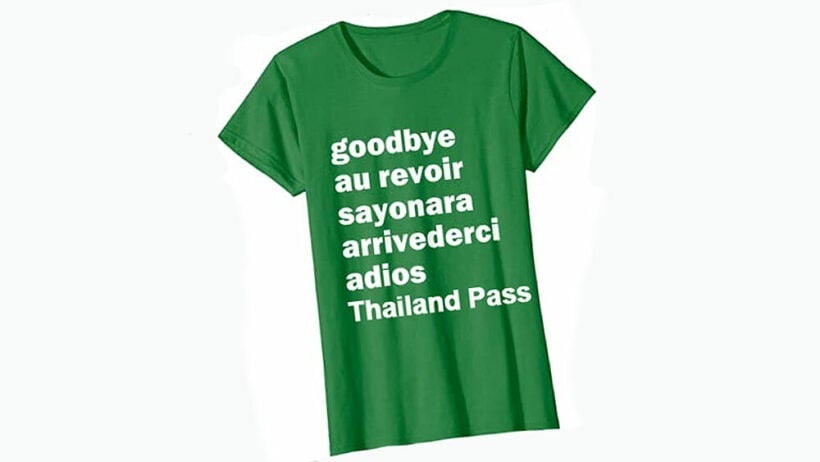Goodbye, adios, good riddance Thailand Pass – OPINION

From today, July 1, there is no more Thailand Pass. The digital online pre-travel registration for people coming into Thailand has had a checkered history and left a bad taste in the north of many foreigners, and Thais, who have had a poor experience with the digital gateway.
After the launch of the Phuket Sandbox on July 1, 2021 – a program to allow fully vaccinated people to arrive on the island of Phuket – Thailand was a leader in Asia during the tentative re-opening phases of the second half of last year. But the late onset of the Omicron variant in Thailand caused a delay in the full dropping of entry restrictions.
But from today there is NO Thailand Pass, no compulsory US$10,000 insurance and NO face masks in open areas (although they are still required on public transport, all domestic flights, and public buildings, including airports).
Here we are, at the start of the second half of 2022, and Thailand is now ‘almost’ fully open again. Fully vaccinated travellers can now travel to Thailand with just their passports. They’ll be required to present their vaccination documents to immigration officials when they arrive, otherwise, that’s it – same as before. And, depending on your passport, you may be granted either a visa fee waiver or an extension on your previous tourist visa stay (check on the Thai embassy website in your country).
For unvaccinated, or under-vaccinated travellers, you will be required to do a PCR test, or professionally-conducted ATK test, 72 hours before their departure to Thailand. Some airlines will also have their travel restrictions in place at this time (check your airline’s requirements before you fly)
In both cases, travellers won’t be required to purchase the compulsory US$10,000 anymore.
To add to the good news the closing times of Thailand’s nightlife was also extended to 2am, just about everywhere around the country. In the tourist enclaves, the closing times were already ‘flexible’ before the official announcement.
After the experience of the Thailand Pass, including the many failures of the system along the way, there is now an opportunity for the Thai government to move from its largely paper-based immigration processes to digital platforms. That, at this stage, is yet to show any early signs of implementation.
But imagine uploading your flight details and passport info into a “Thailand Entry App” and just walking off the plane, scanning your QR code and walking into the country. THAT would be a useful future for a revised Thailand Pass-style digital gateway.
Whilst the number of travellers to Thailand has steadily increased this year, as both the international and Thai Covid situations have improved, the next 6 months will be a critical time as Thai tourism tsars measure the resilience of “brand Thailand”.
But with all the goodwill in the world, there are global headwinds that will surely hinder any full recovery of Thailand’s pre-Covid tourism industry. Suffice to say, it will be mission impossible for a full recovery of Thailand’s pre-Covid tourist numbers in the near future.
COST OF FLIGHTS
Costs of flights into Thailand have increased up to twice their pre-Covid prices. There are still a few discount prices but the supply and demand in the international aviation market, accompanied by a surge in fuel prices, has forced the airlines to charge premium prices for their flights, not just to Thailand, but anywhere. This has been accompanied by a number of staffing and supply chain challenges which are causing summer season flight cancellations and delays, particularly in Europe and the US. Aviation experts expect this to continue for at least the rest of this year.
RUSSIA AND CHINA
The ongoing war in Ukraine has caused a massive drop in tourism options for Russians, once one of the most frequent visitors to Thailand, particularly to Pattaya and Phuket. For the Chinese, the challenges are quite different, with the Chinese government making it very difficult for returning Chinese travellers with strict quarantine arrival procedures.
Many of China’s main cities, including Shanghai and Beijing, are still under severe lockdowns. Travel pundits think that it is unlikely to see any recovery of Chinese outbound tourism until sometime in late 2023, at the earliest. It would take a reversal of the Chinese “Zero Covid” policy before there can be any return to outbound travelling for the Chinese.
Without these two markets, it is an enormous challenge for Thai tourism businesses to expect a short-term return to large tourist arrival numbers. The Chinese, alone, contributed to nearly 30% of the international travellers arriving in Thailand in 2019.
ECONOMIC DOWNTURN
Whilst there were many countries which lavishly handed out stimulus for their economies during the Covid pandemic, from direct financial handouts to business incentives, the downside has been a massive increase in inflation around the world. Growth figures are being slashed in key markets, stock markets have been retracting swiftly since the end of last year and some economies have already reported at least one quarter of negative financial growth, a precursor to an official ‘recession’.
Discretionary spending power is being greatly weakened by all these factors. Travel, to Thailand or anywhere else at this time, is not the main priority for many families and individuals. Travel industry leaders are already reporting that the trend in 2022 is for closer and shorter trips. With this in mind, Thailand can expect much of its tourism to come from short-haul markets, including Indians, Malaysians, Singaporeans and South Koreans.
Brand Thailand will bounce back, for sure, but all stakeholders need to look to a new future rather than assuming that the previous Amazing Thailand will ever return.
Latest Thailand News
Follow The Thaiger on Google News:


























